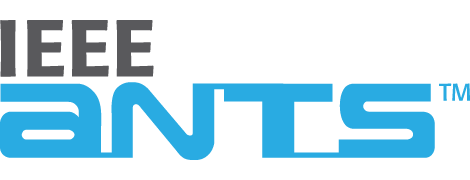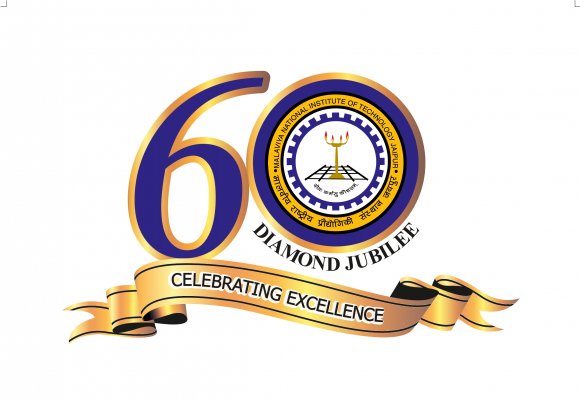Seamless Connectivity with Generative AI - Is it Everyone’s Cup of Tea?
Abstract: This Panel Discussion gives an insight into whether the relatively recent technology - GenAI is for everyone or not. The discussion begins with how seamless digital connectivity is no longer a dream,but very much a reality, thereby laying the foundation for technologies such as GenerativeAI to be adopted at an astounding speed. To align with IEEE ANTS 2023 theme of Seamless Connectivity, an overview of how developments in Edge Computing can help in Seamless Connectivity is first given. Then the audience is introduced to Generative AI with simple real-life examples. The approach adopted is to first take the audience through the comfort zone of ChatGPT from OpenAI which has taken the world by nothing less than a technology-storm. The listener is then made aware of the prelude to the evolution of GenAI. Through Audio-Visual tools, the listener is given a sneak peek into how stalwarts are using GenAI by discussing about OpenAI’s MuseNet for music generation, DALL-E, again from OpenAI, that generates images from textual descriptions, Google’s WaveNet Text To Speech human sounding voice and Deep Dream from Google which transforms ordinary images into magical reality. An insight into the use of GenAI for Text Content Creation, Life-like Character Animation, Video Game Development is also given. After this the audience is hand-held into the discussion about the pros and cons of using GenAI. In this phase, we will invite the audience to questions and encourage interactions. There are a few pointers we have planned here - ethical considerations in its use in Fake News, Deep-fake videos, Academia, Privacy Concerns, Legal & Regulatory Compliance, Quality Critical Content, Loss of Human Connect to name a few. Then we open the door to curiosity questions as to how researchers can leverage the power of GenAI to delve into existing problems in Health Care, Women Safety, Agriculture, Content Generation, Privacy Preservation etc. The discussion ends with the stating that GenAI is indeed the future and how researchers can have innovative ideas and evolve solutions to have that much needed balance between human intelligence and artificial intelligence to maintain a synergy in this world so that the imaginative Elois versus Morlocks in H.G.Well’s Novel, the Time Machine does not lure in front of us as a possible reality!
Focus Areas:
- De-mystifying Seamless Connectivity through Edge Computing
- The “What of GenAI” with real-life examples
- When to & When not to use GenAI
- Current Use-Cases in various domains
- How can a researcher leverage its use
- What the future holds
Panel duration: (Total 90 minutes: 60 min discussion, Total 30 min Q&A encouraged as interspaced)
Timeline for expert discussion: 50 minutes
Moderator time: 10 Minutes
Q & A for audience: 30 Min (encouraged as interspaced between discussions as well as toward the end)
Expected/preferred number of participants: 50+
Panel Lead/Moderator: Dr. Mythili Nair
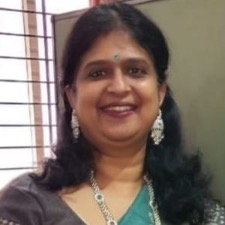
Short Bio: Dr.Mydhili K Nair is currently working as a Professor & Head in School of Computer Science & Engg, RV University. She has a mixed bag of 8 years Industrial Experience & 19 years of Academic Experience. In the IT Industry she has adorned various roles ranging from Technical Lead to Project Manager in different companies such as Wipro, Hexaware, Asset Corporate Consultant to IBM & Mahindra Comviva.
In Academia she has worked in MS Ramaiah Institute of Technology from 2004 and is working in RV University since 2021. She has won the prestigious IBM Faculty Award in the year 2011 for her collaborative research association with IBM. She loves to keep abreast with cutting edge technology. She has filed for 5 patents and has 78 referred publications till date, which includes 6 Book Chapters. She is also in the editorial panel of referred journals & has been a member of the organizing committee, panelist and session chair for many annual symposiums, conferences, such as IEEE CCEM as well as Women In Engineering (WiE) forums such as Grace Hopper Conference, IEEE ANTS WiE track etc.
She is also the faculty mentor for Google Developer Student Club of MSRIT. She & her students have won many project competitions & best paper awards at State & National level, including Smart India Hackathon for three successive years. She is passionate about teaching and mentoring student projects, some of which have actual end-users. Her current area of interest is to Apply Technology such as Generative AI for Societal Benefits, especially in the Assistive Technologies sector, mainly visually impaired.
Contact: Professor & Head in School of Computer Science & Engg, RV University. Email: mydhilinair@rvu.edu.in
Panelists: Dr.Meenakshi Tripathi
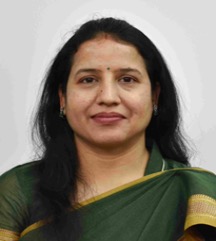
Short Bio: Meenakshi Tripathi is an Associate Professor in the department of computer science and engineering at MNIT Jaipur. She received her Ph.D. degree in Computer Science and Engineering from the MNIT in 2015 . She has more than 15 years of teaching/research experience in computer science and information security. She has published more than 100 research articles in leading journals, conference proceedings and books including IEEE Transactions, IJCS, Computer networks, journal of supercomputing etc.. Under her guidance 4 students have already awarded their Ph.D. degree and 5 more are working with her. She has supervised around 33 PG students and more than 60 UG students for their project work. She holds several professional designations including Dean at Rajasthan Skilled University Jaipur, BoS member of university of Kota, Ex-chairman of CSI Jaipur chapter, BoS member of Central University of Rajasthan etc. She was the organizing chair for various FDPs/conferences/workshops such as ANTS’23, ICD LAIR-2019, ATAL FDP on "Cyber Security", FDP on "Software Defined Networks", FDP on "Technical Writing: Tools and techniques'' etc. She has also received funding from IEEE CIS for organizing Summer School in 2022 and 2023 respectively. She is a senior member of IEEE, member of ACM and lifelong member of CSI. Her research interests include information security, wireless sensor networks, IoT, Software Defined Networks, blockchain etc.
Contact: Associate Professor in the CSE at MNIT Jaipur. Email: mtripathi.cse@mnit.ac.in
Panelists: Dr. Vidya M J
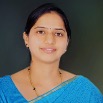
Short Bio: Dr. Vidya M J is currently working as Assistant Professor, School of Computer Science (SoCSE), RV University. She has 12 years of teaching experience in the field of Embedded Systems, Signal & Image Processing. With a Ph.D. in Secured Signal & Image Data Transmission from Visvesvaraya Technological University, M.Tech in Signal Processing from R V College of Engineering and B.E in Electronics and Communication Engineering, VTU.,she also bags experience in Start-Up initiation with successful productization like “AmruthaHani – Automatic Theertha Dispenser – a solution for a social cause”, Dantastra etc.,
She has worked collaboratively with Industry, Hospitals and Institutions like CISCO, National Instruments, Emilite Solutions, St Johns Medical Hospital, RV Dental Hospitals, IISc, GKVK for joint research projects and development of real-time solutions, through MOUs. She has published articles in Scopus Indexed Journals.
In addition to her research and teaching, she has also conducted hands-on sessions for IoT courses, covering a wide array of platforms, including Arduino and Raspberry Pi and other embedded processors to the field of healthcare also.
Contact: Assistant Professor, School of Computer Science & Engineering, RV University. Email: vidyam@rvu.edu.in
Panelists: Prof. Veena S

Short Bios: Prof. Veena S is a dedicated academician and researcher, currently serving as an Assistant Professor at RV University. Her journey in academia spans over six years, during which she has passionately shared her knowledge and expertise with students at PES University, DSCE.
Before venturing into academia, Prof. Veena gained valuable experience in the aerospace domain. She served as a Junior Engineer at the esteemed National Aerospace Laboratories, contributing to Micro Aerial Vehicle projects.
Currently, she is pursuing her Ph.D. in the field of Vehicular Edge Computing, with a primary focus on computation offloading, M.tech in Electronics from Ambedkar Institute of Technology. Her research holds promise for addressing contemporary challenges in this field and contributing to cutting-edge technological advancements.
She has an impressive research portfolio, with over 10 international research publications in peer-reviewed journals and conferences. Her work reflects her commitment to advancing knowledge and staying at the forefront of her field.
In addition to her research and teaching, she has also conducted hands-on sessions for IoT courses, covering a wide array of platforms, including Arduino, Raspberry Pi, and STM32 processors. Her practical guidance has equipped students with the skills needed to navigate the complex world of IoT.
Contact: Assistant Professor at School of Computer Science & Engineering, RV University. Email: veenas@rvu.edu.in
Panelists: Dr.Jyoti Joshi

Short Bios: Dr. Jyoti Joshi, is the founder and CEO of Kroop.ai. Kroop.ai is a deep tech startup that has developed a sophisticated audio-visual deep learning platform. She is a first-generation entrepreneur and an AI scientist with a PhD from the University of Canberra, Australia. She worked for mental health analysis and put in stints at the University of Waterloo, Canada and Monash University, Australia. With research experience at institutions like University of Waterloo, Australian National University, University of Pittsburgh, and Queen Mary University of London, she brings a rich academic background. Dr. Joshi's industry experience includes a role at Cadence Design Systems. Notably, she is a Google Anita Borg Scholarship finalist, Fiorella De Rosis honour award winner, and was a finalist at the ‘Future Women Leaders Conference’ jointly hosted by the University of Melbourne and Monash University.
Contact: Dr. Jyoti Joshi at Founder and CEO of Kroop.ai. Email: jyoti@kroop.ai
Panelists: Nathalie Baracaldo
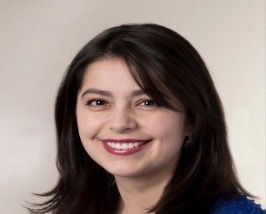
Short Bios: Nathalie Baracaldo leads the AI Security and Privacy Solutions team and is a Research Staff Member at IBM’s Almaden Research Center in San Jose, CA. Nathalie is passionate about delivering machine learning solutions that are highly accurate, withstand adversarial attacks and protect data privacy. Her team focuses on two main areas: federated learning, where models are trained without directly accessing training data and adversarial machine learning, where defenses are designed to withstand potential attacks to the machine learning pipeline (see more details).
Nathalie is the primary investigator for the DARPA program Guaranteeing AI Robustness Against Deception (GARD), where AI security is investigated. Her team contributes to the Adversarial Robustness 360 Toolbox (ART).
Nathalie's primary research interests lie at the intersection of information security, privacy and trust. As part of her work, she has also designed and implemented secure systems in the areas of cloud computing, Platform as a Service, secure data sharing and Internet of the Things. She has also contributed to projects to design scalable systems that monitor, manage performance and manage service level agreements in cloud environments.
Contact: Research Staff Member at IBM’s Almaden Research Center in San Jose, CA Email: baracald@us.ibm.com
Panelists: Dr. Preeti Bhatt
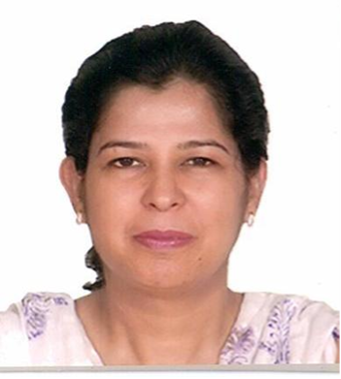
Short Bios: Dr. Preeti Bhatt, is an Associate Professor in English, and Head of the Department of Humanities and Social Sciences, Malaviya National Institute of Technology, Jaipur, India. With a teaching experience of more than twenty-five years, Dr. Bhatt’s research interest lies in Twentieth Century Fiction and Drama, Indian Writing in English, Narrative Theory and Communication Skills.
Dr. Bhatt is currently also the Presiding Officer of the Internal Complaints Committee (ICC) and Coordinator of the Women’s Cell of the Institute. Dr. Bhatt has authored and co-edited several books, including Resilience and Transformation for Global Restructuring (2022) published by Ethics International Press Limited, UK. She has presented research papers at International Conferences at Nanyang Technological University, La Trobe University, Oxford University, for which she was awarded Travel Grants by the University Grants Commission, and by the concerned universities. She has also presented papers at Feng Chia University, Taichung and at Dubai in person and at online international conferences at Germany, Turkey and other countries. Dr. Bhatt has published several research papers in national and international journals and in edited volumes. She has organized International and National Conferences and Faculty Development Programs at MNIT Jaipur. She has successfully supervised several PhD scholars and has worked on research projects funded by the UGC, the British Council, TEQIP III and DSIR, New Delhi. Dr. Bhatt successfully coordinated a one-week Global Initiative of Academic Networks (GIAN) course on “South Asian Literature and Films: 1990 – Present” in May 2022.
Contact: Associate Professor and Head of the Department of Humanities and Social Sciences, MNIT Jaipur. Email: pbhatt.hum@mnit.ac.in
Panelists: Dr. Aruna Pancharia
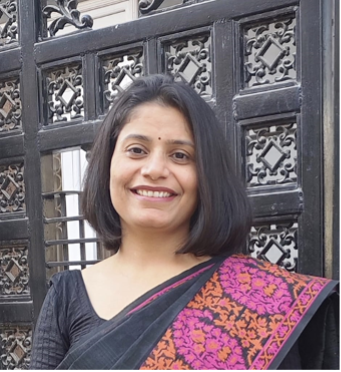
Short Bios: Dr. Aruna Pancharia, is currently working as Associate Professor, Government medical college Bhilwara. She completed her M.B.B.S from Jaipur in 2004 and M.DPathology from udaipur in 2012 . She is an expert in the field of oncology , looking at Histopathology in Pathology . She has 20 Research publications in cancer cervix, lung ,Breast. She worked in Geetanjali medical college Udaipur and Mahatma Gandhi college Jaipura as Assistant professor.
Which was launched in corona period to continue study of medical students For that she was awarded By MEWAR GAURAV AWARD in 2022.
She is involved in cancer awareness,and menstrual Hygiene campaigns and for that she was awarded the Iron lady award 2022. She is also an International and national speaker in Continuing Medical Education programmes.
Contact: Associate Professor, Government medical college, Bhilwara. Email: sumanannu1984@gmail.com
